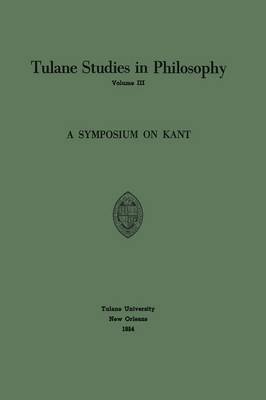HE past does not change; it cannot, for what has happened T cannot be undone. Yet how are we to understand what has happened? Our perspective on it lies in the present, and is subject to continual change. These changes, made in the light of our new knowledge and new experience, call for fresh evaluations and constant reconsideration. It is now one hundred fifty years since the death of Immanuel Kant, and this, the third volume of Tulane Studies in Philosophy is dedicated to the commemoration of the event. The diversity of the contributions to the volume serve as one indication of Kant's persistent importance in philoso phy. His work marks one of the most enormous turns in the whole history of human thought, and there is still much to be done in estimating its achievement. His writings have not been easy to assimilate. The exposition is difficult and labored; it is replete with ambiguities, and even with what often appear to be contradictions. Such writings allow for great latitude in interpretation. Yet who would dare *to omit Kant from the account? The force of a man's work is measured by his influence on other thinkers; and here, Kant has few superiors. Of no man whose impact upon the history of ideas has been as great as that of Kant can it be said with finality: this 5 6 TULANE STUDIES IN PHILOSOPHY is his philosophy.
- ISBN13 9789024702770
- Publish Date 31 January 1964
- Publish Status Active
- Publish Country NL
- Publisher Springer
- Imprint Kluwer Academic Publishers
- Format Paperback
- Pages 165
- Language English
